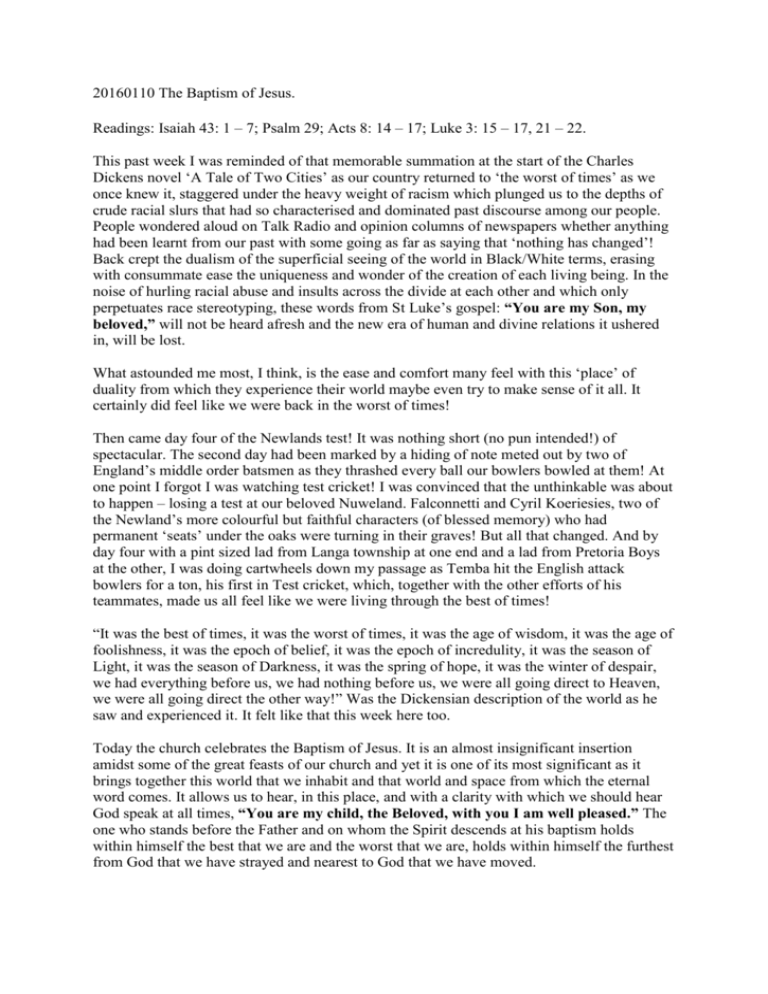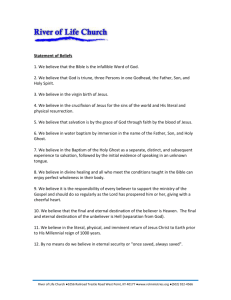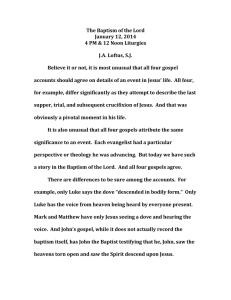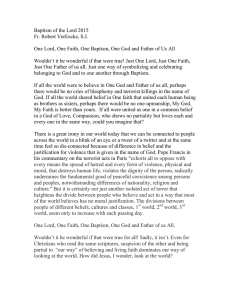20160110 The Baptism of Jesus.
advertisement

20160110 The Baptism of Jesus. Readings: Isaiah 43: 1 – 7; Psalm 29; Acts 8: 14 – 17; Luke 3: 15 – 17, 21 – 22. This past week I was reminded of that memorable summation at the start of the Charles Dickens novel ‘A Tale of Two Cities’ as our country returned to ‘the worst of times’ as we once knew it, staggered under the heavy weight of racism which plunged us to the depths of crude racial slurs that had so characterised and dominated past discourse among our people. People wondered aloud on Talk Radio and opinion columns of newspapers whether anything had been learnt from our past with some going as far as saying that ‘nothing has changed’! Back crept the dualism of the superficial seeing of the world in Black/White terms, erasing with consummate ease the uniqueness and wonder of the creation of each living being. In the noise of hurling racial abuse and insults across the divide at each other and which only perpetuates race stereotyping, these words from St Luke’s gospel: “You are my Son, my beloved,” will not be heard afresh and the new era of human and divine relations it ushered in, will be lost. What astounded me most, I think, is the ease and comfort many feel with this ‘place’ of duality from which they experience their world maybe even try to make sense of it all. It certainly did feel like we were back in the worst of times! Then came day four of the Newlands test! It was nothing short (no pun intended!) of spectacular. The second day had been marked by a hiding of note meted out by two of England’s middle order batsmen as they thrashed every ball our bowlers bowled at them! At one point I forgot I was watching test cricket! I was convinced that the unthinkable was about to happen – losing a test at our beloved Nuweland. Falconnetti and Cyril Koeriesies, two of the Newland’s more colourful but faithful characters (of blessed memory) who had permanent ‘seats’ under the oaks were turning in their graves! But all that changed. And by day four with a pint sized lad from Langa township at one end and a lad from Pretoria Boys at the other, I was doing cartwheels down my passage as Temba hit the English attack bowlers for a ton, his first in Test cricket, which, together with the other efforts of his teammates, made us all feel like we were living through the best of times! “It was the best of times, it was the worst of times, it was the age of wisdom, it was the age of foolishness, it was the epoch of belief, it was the epoch of incredulity, it was the season of Light, it was the season of Darkness, it was the spring of hope, it was the winter of despair, we had everything before us, we had nothing before us, we were all going direct to Heaven, we were all going direct the other way!” Was the Dickensian description of the world as he saw and experienced it. It felt like that this week here too. Today the church celebrates the Baptism of Jesus. It is an almost insignificant insertion amidst some of the great feasts of our church and yet it is one of its most significant as it brings together this world that we inhabit and that world and space from which the eternal word comes. It allows us to hear, in this place, and with a clarity with which we should hear God speak at all times, “You are my child, the Beloved, with you I am well pleased.” The one who stands before the Father and on whom the Spirit descends at his baptism holds within himself the best that we are and the worst that we are, holds within himself the furthest from God that we have strayed and nearest to God that we have moved. In Jesus the duality is bridged and the pattern of that bridging is then reflected in the lives of the baptised. The early Christians understood this as it emphasised the intrinsic worth and qualitative value of each person and the nature of the relationships in community among whom there is neither Jew not Gentile, slave nor free, male nor female. In Christ and among those who now live in the new life which Christ ushers in through his person and ministry, the old order is overcome and new has arrived. God’s power and God’s grace has been made manifest among them through the outpouring of the Spirit. Like Jesus of Nazareth, the community needed to know that there was a cost in living this new order where enemies become friends and where a new community emerged from the fragments of an old scattered and divided people. For this to happen, the cross would always have central place as a reminder that it is in losing our life that we gain it. In the gospel today Jesus stands at the waters of the Jordan to be baptised by John as he takes on all of the human mess of sin and disobedience of which we are capable. John recognises that he is the Lamb of God who will take away the sin of the world and that it should be him rather than John performing the baptism. Here at this place which is remembered as that which separate life in slavery in Egypt from life in the promised land, life as an exile in Babylon to a life reflecting restored hope in the land of forebears where once a people crossed from brokenness and humiliation, God’s Son now stood as the bridge joining their divided world and bringing it all into one. God had crossed in Jesus and embraced humanness leaving no doubt about their value and worth as beloved children of the Father. The Isaiah reading addresses the fear of stepping out from that which has become familiar. “Do not fear, for I have redeemed you; I have called you by name, you are mine.” I have always been struck by this passage as it suggests that we can lose our true identity and make ourselves comfortable in the landscape of exile – whether imposed or embraced through expediency. The thought of being set free from it can be a frightening thought for the identity we have been given also brought with it a place and station in life. Like Stockholm Syndrome, where the captive empathises with the captor rationalising the conduct to the point of almost not wanting to escape and taste freedom. It is one of life’s more interesting phenomenon that we are so good at adapting to our chains to the point that some even thrive. “You should have left us in Egypt instead of bringing us here to die!” the people moaned at Moses. That Isaiah passage then lists the hardships they will face on the journey to freedom – crossing rivers, walking through fire none of these will overwhelm them though neither shall they be burnt. In the person of Jesus, Son of God with whom God is pleased in born a new community and a new direction set for humanity. We live the life he taught and lived because God has validated that life by God’s own presence in it and with it. I have little or no interest in race relations, neither do have much patience for preaching tolerance. I cannot think of a worse place to live than to be tolerated by others! The baptism of Jesus puts a human face on God but also validates our humanity and makes us co-workers with the Spirit to produce patience, kindness, goodness, faithfulness, gentleness, self control, love, joy and peace. In a Tale of Two cities the narrator has this to say: “A wonderful fact to reflect upon, that every human creature is constituted to be that profound secret and mystery to every other. A solemn consideration, when I enter a great city by night, that every one of those darkly clustered houses encloses its own secret; that every room in every one of them encloses its own secret; that every beating heart in the hundreds of thousands of breasts there, is, in some of its imaginings, a secret to the heart nearest it!” Amen.











